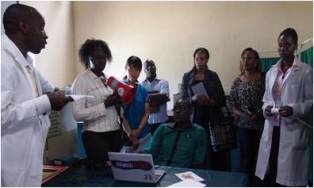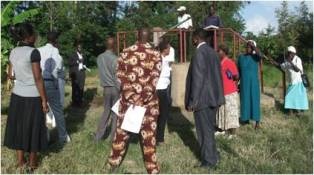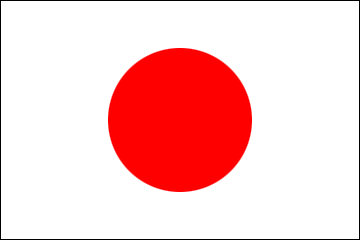TICAD V Press Briefing and Site Visit – 13th ,15th May 2013
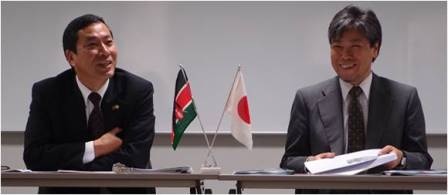
On 13th May 2013, a press briefing on TICADV for Kenya’s media houses was held at the Japan Information and Culture Centre by Ambassador of Japan to the Republic of Kenya H.E. Mr. Toshihisa Takata and Chief Representative of JICA Mr. Hideo Eguchi.
TICAD stands for Tokyo International Conference on African Development. It was launched 20years ago in 1993, When the cold war had just ended. There was “aid fatigue” in the richer countries which affected Africa. The first TICAD stirred this trend and rekindled discussion on Africa.
TICAD mobilized wisdom and resources for the development of Africa. Ownership of African Countries and Partnership of the International community were the guiding principles of TICAD.
TICAD is a forerunner of other forums for African development. Different countries have come up with similar forums. But TICAD remains unique in its open and inclusive approach: it is a forum where not only African leaders but also other important stakeholders of African development meet, such as bilateral donors, international development, humanitarian and financial organizations, Africa’s regional organizations and civil society organizations.
Another unique characteristic of TICAD is its annual Africa’s ministers’ follow-up mechanism. Japanese Foreign minister visits Africa for a follow-up meeting with Africa’s ministers to monitor the implementation of commitments and discuss future course.
Preparations for TICAD V have evolved through the following meetings:
- Ministerial follow-up Meeting in Morocco (May 5-6, 2012)
- Preparatory Senior Officials Meeting in Burkina Faso (November 15-17, 2012)
- Ministerial Preparatory Meeting in Addis Ababa (where the participants agreed on the declaration to be discussed at TICAD V and its Action Plan) (March 16-17, 2013)
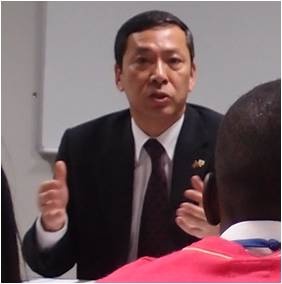
Africa has changed drastically over the past twenty years. Many African countries have recorded impressive growth rates, with Sub-Saharan Africa’s growth rate exceeding 5% last year. This growth needs to be accelerated. In that process, its benefit needs to be extended more equitably among the people of Africa. There is also a need to focus on the quality of development. Thus there are three areas of focus at TICAD V : Robust and Sustainable Economy, Creating Inclusive and Resilient Societies, and Building Peace and Stability
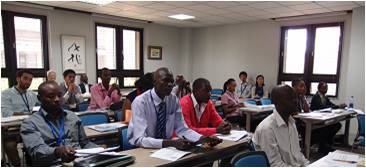
Private investment plays a vital role for growth. Private sector–driven growth will require not only better infrastructure, but also human resources development. A private sector–driven growth will encourage better quality in services.
Discussions in Yokohama this year will also touch on the post MDGs phase in Africa. Here again, the Japanese emphasis on human security in development should encourage the discussion of empowerment of the youth and women as well as peace and stability.
A large number of stakeholders are expected to attend the TICAD V conference. There will be a number of important side events. They include African Fair, symposiums and seminars for the private sector, and the 2nd Hideo Noguchi Prize Award Ceremony.
TICAD, naturally, is also a forum to strengthen bilateral ties between Japan and individual African countries.
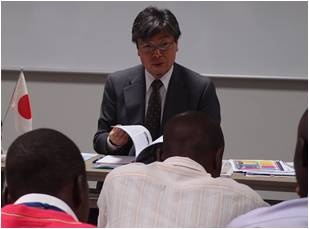
This year marks not only be the 20th anniversary of TICAD but also the 50th Anniversary of the establishment of diplomatic relations between Japan and Kenya as well as the 50th Jubilee of the creation of African Union. In this context, TICAD V is an important event for the promotion of even closer cooperation between Japan and Kenya to achieve Kenya’s Vision 2030. Japan’s five priority areas of cooperation with Kenya are Infrastructure & Energy, Agriculture, Water and Sanitation, Education and Health.
The Press Briefing was followed by project site visit to the Nairobi Western Ring Roads (Missing Links) and the Japanese Overseas Cooperation Volunteers (JOCVs).
Two days later on 15th May 2013, media representatives visited two Japanese funded project sites in Kisumu; the Strengthening of Management for Health in Nyanza Province (SEMAH) project, a model health centre with a computerized health information system (the first in Sub-Sahara Africa), and the Nyando Flood Management Grant Aid Project, a project to improve flood management capacity through community-driven disaster management programmes in the Nyando River Basin.
